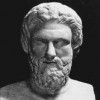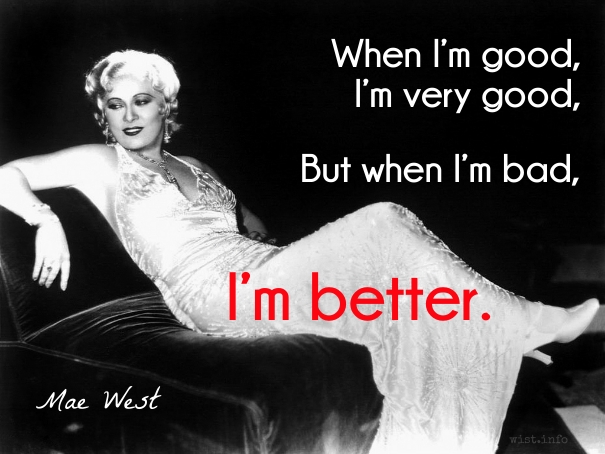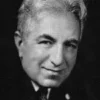The meaning of good & bad, of better & worse, is simply helping or hurting.
Quotations about:
vice
Note not all quotations have been tagged, so Search may find additional quotes on this topic.
It is among the evils of slavery that it taints the very sources of moral principle. It establishes false estimates of virtue and vice: for what can be more false and heartless than this doctrine which makes the first and holiest rights of humanity to depend upon the color of the skin?
This is a vice in them, that were a vertue in us; for obstinacy in a bad cause, is but constancy in a good.
Thomas Browne (1605-1682) English physician and author
Religio Medici, Part 1, sec. 25 (1643)
(Source)
Times change. The vices of your age are stylish today.
Aristophanes (c. 450-c. 388 BC) Athenian comedic playwright
The Clouds, l. 914 (c. 423 BC) [tr. Arrowsmith (1962)]
This phrase comes from a single translation, by William Arrowsmith (1962), of Aristophanes, The Clouds, l. 914. It is the only translation that includes anything like that:
[909] Philosophy: Why, you Precocious Pederast! You Palpable Pervert!
[910] Sophistry: Pelt me with roses!
[910] Philosophy: You Toadstool! O Cesspool!
[911] Sophistry: Wreath my hairs with lilies!
[911] Philosophy: Why, you Parricide!
[912] Sophistry: Shower me with gold! Look, don't you see I welcome your abuse?
[913] Philosophy: Welcome it, monster? In my day we would have cringed with shame.
[914] Sophistry: Whereas now we're flattered. Times change. The vices of your age are stylish today.
Compare to Hickey (1853):[909] Just Cause: You are debauched and shameless.
[910] Unjust Cause: You have spoken roses of me.
[910] Just Cause: And a dirty lickspittle.
[911] Unjust Cause: You crown me with lilies.
[911] Just Cause: And a parricide.
[912] Unjust Cause: You don't know that you are sprinkling me with gold.
[913] Just Cause: Certainly not so formerly, but with lead.
[914] Unjust Cause: But now this is an ornament to me.
Like the tiger, that seldom desists from pursuing man after having once preyed upon human flesh, the reader, who has once gratified his appetite with calumny, makes ever after, the most agreeable feast upon murdered reputation.
When I’m good, I’m very good, but when I’m bad, I’m better.
“Vice,” said Mr. Dooley, “is a creature of such heejous mein, as Hogan says, that th’ more ye see it th’ betther ye like it.”
[“Vice,” said Mr. Dooley, “is a creature of such hideous mien, as Hogan says, that the more you see it the better you like it.”]
Finley Peter Dunne (1867-1936) American humorist and journalist
“The Crusade Against Vice,” Mr. Dooley’s Opinions (1901)
(Source)
Step by step they were led to things which dispose to vice: the lounge, the bath, the elegant banquet. All this in their ignorance they called civilisation, when it was but a part of their servitude.
[Idque apud imperitos humanitas vocabatur, cum pars servitutis esset.]
It is not going in [to the brothel] that is a problem, but not being able to come out.
Aristippus of Cyrene (c. 435 – c. 356 BC) Cyrenaic philosopher, Hedonist
Fragment 59 [Mannebach]
(Source)
Anything I like is either illegal or immoral or fattening.
Alexander Woollcott (1887-1943) American critic, commentator, journalist, wit
(Attributed)
Apparently a gag attributed by Woollcott to a Frank Rand of St. Louis on his radio show in September 1933; it was then directly attributed to Woollcott in Reader's Digest in Dec. 1933. It is sometimes cited to Woollcott's essay "The Knock at the Stage Door," The North American Review (Sep 1922), but not found there.
Variants:More discussion about this quotation:
- "All the things I like to do are either immoral, illegal, or fattening."
- "All the things I really like to do are either immoral, illegal or fattening."
- "Everything I want to do is either illegal, immoral or fattening."
The evil that is in the world always comes of ignorance, and good intentions may do as much harm as malevolence, if they lack understanding. On the whole men are more good than bad; that, however, isn’t the real point. But they are more or less ignorant, and it is this that we call vice or virtue; the most incorrigible vice being that of an ignorance which fancies it knows everything and therefore claims for itself the right to kill. There can be no true goodness, nor true love, without the utmost clear-sightedness.
Honest statesmanship is the wise employment of individual meannesses for the public good.
Abraham Lincoln (1809-1865) American lawyer, politician, US President (1861-65)
(Attributed)
(Source)
Attributed in John G. Nicolay and John Hay, Abraham Lincoln: A History, vol. 10, ch. 18 "Lincoln's Fame" (1886).
Courage is a quality so necessary for maintaining virtue that it is always respected, even when it is associated with vice.
Samuel Johnson (1709-1784) English writer, lexicographer, critic
Comment (11 Jun 1784)
(Source)
In James Boswell, The Life of Samuel Johnson (1791)
Therefore virtue also depends on ourselves. And so also does vice. For where we are free to act we are also free to refrain from acting, and where we are able to say No we are also able to say Yes; if therefore we are responsible for doing a thing when to do it is right, we are also responsible for not doing it when not to do it is wrong, and if we are responsible for rightly not doing a thing, we are also responsible for wrongly doing it. But if it is in our power to do and to refrain from doing right and wrong, and if, as we saw, being good or bad is doing right or wrong, it consequently depends on us whether we are virtuous or vicious.
Aristotle (384-322 BC) Greek philosopher
Nicomachean Ethics [Ἠθικὰ Νικομάχεια], Book 3, ch. 5 (3.5) / 1113b (c. 325 BC) [tr. Rackham (1934)]
(Source)
Source of the common summary, "What lies in our power to do, it lies in our power not to do." Alternate translations:
Virtue is in our power. And so too is Vice: because wherever it is in our power to do it is also in our power to forbear doing, and vice versâ: therefore if the doing (being in a given case creditable) is in our power, so too is the forbearing (which is in the same case discreditable), and vice versâ. But if it is in our power to do and to forbear doing what is creditable or the contrary, and these respectively constitute the being good or bad, then the being good or vicious characters is in our power.
[tr. Chase (1847), ch. 7]
Virtue is in our own power, and, by parity of reasoning, so is vice. For where it is in our power to do a thing, it is equally in our power to abstain from doing it; where refusal is in our power, assent is equally so. So that, if to do such or such a thing, which is noble, be in our power, to abstain from it, which is disgraceful, will be equally in our power; and ift0o abstain from doing such or such a thing, which is noble, be in our power, then to do it, which is disgraceful, will be equally in our power. And if, in a word, it be in our power to do what is noble and what is disgraceful, it is equally in our power not to do it. Or in other words, it is in our power to be good men or bad. It rests, then, with ourselves whether we are to be virtuous or vicious.
[tr. Williams (1869)]
Virtue and vice are both alike in our own power; for where it is in our power to act, it is also in our power to refrain from acting, and where it is our power to refrain from acting, it is also in our power to act. Hence if it is in our power to act when action is noble, it will also be in our power to refrain from acting when inaction is shameful, and if it is our power to refrain from acting when inaction is noble, it will also be in our power to act when action is shameful. But if it is in our power to do, and likewise not to do, what is noble and shameful, and if so to act or not to act is as we have seen to be good or bad, it follows that it is in our power to be virtuous or vicious.
[tr. Welldon (1892), ch. 7]
Therefore virtue depends upon ourselves: and vice likewise. For where it lies with us to do, it lies with us not to do. Where we can say no, we can say yes. If then the doing a deed, which is noble, lies with us, the not doing it, which is disgraceful, lies with us; and if the not doing, which is noble, lies with us, the doing, which is disgraceful, also lies with us. But if the doing and likewise the not doing of noble or base deeds lies with us, and if this is, as we found, identical with being good or bad, then it follows that it lies with us to be worthy or worthless men.
[tr. Peters (1893)]
Therefore virtue also is in our own power, and so too vice. For where it is in our power to act it is also in our power not to act, and vice versa; so that, if to act, where this is noble, is in our power, not to act, which will be base, will also be in our power, and if not to act, where this is noble, is in our power, to act, which will be base, will also be in our power. Now if it is in our power to do noble or base acts, and likewise in our power not to do them, and this was what being good or bad meant, then it is in our power to be virtuous or vicious.
[tr. Ross (1908)]
Virtue too is up to us, then, and similarly, vice. For where acting is up to us, so is not acting, and where saying "No" is up to us, so is saying "Yes." Hence if acting, when it is noble, is up to us, not acting, when it is shameful, will also be up to us. And if not acting, when it is noble, is up to us, acting, when it is shameful, will also be up to us. But if doing noble actions or doing shameful ones is up to us, and similarly, also not doing them (which is what being good people and being bad people consisted in), then being decent or base will be up to us.
[tr. Reeve (1948)]
So virtue, too, is in our power, and also vice for a similar reason. For where it is in our power to act, it is also in our power not to act, and where it is in our power not to act, it is also in our power to act; so if to act, when it is noble, is in our power, then also not to act, which would then be disgraceful, would be in our power, and if not to act, when it is noble, is in our power, then also to act, which would then be disgraceful, would be in our power. If it is in our power, then, to do what is noble or disgraceful, and likewise not to do what is noble or disgraceful, and to act or not to act nobly or disgracefully, as stated earlier, is to be good or bad, then it is our power to be good or bad men.
[tr. Apostle (1975)]
Therefore virtue lies in our power, and similarly so does vice; because where it is in our power to act, it is also in our power not to act, and where we can refuse we can also also comply. So if is in our power to do a thing when it is right, it will also be in our power not to do it when it is wrong; and if it is in our power not to do it when it is right, it will also be in our power to do it when it is wrong. And if it is in our power to do right and wrong, and similarly not to do them; and if, as we saw, doing right or wrong is the essence of being good or bad, it follows that it is in our power to be decent or worthless.
[tr. Thomson/Tredennick (1976)]
Virtue, then, is in our power, and so is vice. Where it is in our power to act, it is also in our power not to act, and where saying "No" is in our power, so is saying "Yes" so that if it is in our power to act when it would be noble, it will also be in our power not to act when it would be shameful, and if it is in our power not to act when it would be noble, it will also be in our power to act when it would be shameful. Now if it is in our power to do noble and shameful actions, and the same goes for not doing them, and if, as we saw, being good and bad consists in this, then it is in our power to be good or bad.
[tr. Crisp (2000)]
The virtues of society are the vices of the saint. The terror of reform is the discovery that we must cast away our virtues, or what we have always esteemed such, into the same pit that has consumed our grosser vices.
Ralph Waldo Emerson (1803-1882) American essayist, lecturer, poet
“Circles,” Essays: First Series (1841)
(Source)
The ways to enrich are many, and most of them foul.
Francis Bacon (1561-1626) English philosopher, scientist, author, statesman
“Of Riches,” Essays, No. 34 (1625)
(Source)
The first thing that happens to men once they have had to give up any pleasure, whether for propriety’s sake, or from satiety, or for their health, is to condemn it in other people. Such behavior implies a sort of attachment to the very things one has just renounced: we want nobody else to enjoy the good things that we have lost; it is a feeling of jealousy.
[La première chose qui arrive aux hommes après avoir renoncé aux plaisirs, ou par bienséance, ou par lassitude, ou par régime, c’est de les condamner dans les autres. Il entre dans cette conduite une sorte d’attachement pour les choses mêmes que l’on vient de quitter; l’on aimerait qu’un bien qui n’est plus pour nous ne fût plus aussi pour le reste du monde: c’est un sentiment de jalousie.]
Jean de La Bruyère (1645-1696) French essayist, moralist
The Characters [Les Caractères], ch. 11 “Of Mankind [De l’Homme],” § 112 (11.112) (1688) [tr. Stewart (1970)]
(Source)
(Source (French)). Alternate translations:
The first thing men do, when they have renounc'd pleasure, either out of decency, surfeit, or conviction, is to condemn it in others. This sort of management is however seldom free from a particular affection for those very things they left off, but they would have no body enjoy the pleasure they can no longer enjoy themselves, which proceeds more from Jealousie than any thing else.
[Bullord ed. (1696)]
The first thing Men do, when they have renounc'd Pleasure, either out of Decency, Surfeit, or Conviction, is to condemn it in others. They preserve, in this Conduct, a sort of Affection for the very things they left off; they would have no body enjoy the Pleasure they can no longer enjoy themselves: 'Tis a sentiment of Jealousy.
[Curll ed. (1713)]
The first Thing, when Men have renounced Pleasure, either out of Decency, Satiety, or Necessity, is to condemn it in others. This Sort of Reproof, however, is not free from a latent Affection for their forsaken Pleasures; they would interdict to all others what they can themselves no longer enjoy; their Admonitions are the Snarlings of Jealousy, not the Dictates of Purity.
[Browne ed. (1752)]
The first thing men do when they have renounced pleasure, through decency, lassitude, or for the sake of health, is to condemn it in others. Such conduct denotes a kind of latent affection for the very things they left off; they would like no one to enjoy a pleasure they can no longer indulge in; and thus they show their feelings of jealousy.
[tr. Van Laun (1885)]
For prosperity doth best discover vice, but adversity doth best discover virtue.
Francis Bacon (1561-1626) English philosopher, scientist, author, statesman
“Of Adversity,” Essays, No. 5 (1625)
(Source)
Virtue, then, is a state involving rational choice, consisting in a mean relative to us and determined by reason — the reason, that is, by reference to which the practically wise person would determine it. It is a mean between two vices, one of excess, the other of deficiency. It is a mean also in that some vices fall short of what is right in feelings and actions, and others exceed it, while virtue both attains and chooses the mean.
[ἔστιν ἄρα ἡ ἀρετὴ ἕξις προαιρετική, ἐν μεσότητι οὖσα τῇ πρὸς ἡμᾶς, ὡρισμένῃ λόγῳ καὶ ᾧ ἂν ὁ φρόνιμος ὁρίσειεν. μεσότης δὲ δύο κακιῶν, τῆς μὲν καθ᾽ ὑπερβολὴν τῆς δὲ κατ᾽ ἔλλειψιν: καὶ ἔτι τῷ τὰς μὲν ἐλλείπειν τὰς δ᾽ ὑπερβάλλειν τοῦ δέοντος ἔν τε τοῖς πάθεσι καὶ ἐν ταῖς πράξεσι, τὴν δ᾽ ἀρετὴν τὸ μέσον καὶ εὑρίσκειν καὶ αἱρεῖσθαι.]
Aristotle (384-322 BC) Greek philosopher
Nicomachean Ethics [Ἠθικὰ Νικομάχεια], Book 2, ch. 5 (2.6.15-16) / 1106b.35 (c. 325 BC) [tr. Crisp (2000)]
(Source)
(Source (Greek)). Alternate translations:
Virtue then is “a state apt to exercise deliberate choice, being in the relative mean, determined by reason, and as the man of practical wisdom would determine.” It is a middle state between too faulty ones, in the way of excess on one side and of defect on the other: and it is so moreover, because the faulty states on one side fall short of, and those on the other exceed, what is right, both in the case of the feelings and the actions; but Virtue finds, and when found adopts, the mean.
[tr. Chase (1847)]
Moral virtue, then, is a certain formed state, or habit of purpose, which conforms to the relative mean in action, and which is determined to that mean by reason, or as the prudent man would determine it. And it is the mean between two vices, one of which consists in excess, and the other in defect. So that vices sometimes fall short of what is right in our emotions and in our actions, and sometimes exceed it, while virtue fines the mean and chooses it.
[tr. Williams (1869)]
Virtue then is a state of deliberate moral purpose consisting in a mean that is relative to ourselves, the mean being determined by reason, or as a prudent man would determine it. It is a mean state firstly as lying between two vices, the vice of excess on the one hand, and the vice of deficiency on the other, and secondly because, whereas vices either fall short of or go beyond what is proper in the emotions and actions, virtue not only discovers but embraces the mean.
[tr. Welldon (1892)]
Virtue, then, is a habit or trained faculty of choice, the characteristic of which lies in moderation or observance of the mean relatively to the persons concerned, as determined by reason, i.e. by the reason by which the prudent man would determine it. And it is a moderation, firstly, inasmuch as it comes in the middle or mean between two vices, one on the side of excess, the other on the side of defect; and, secondly, inasmuch as, while these vices fall short of or exceed the due measure in feeling and in action, it finds and chooses the mean, middling, or moderate amount.
[tr. Peters (1893)]
Virtue, then, is a state of character concerned with choice, lying in a mean, i.e. the mean relative to us, this being determined by a rational principle, and by that principle by which the man of practical wisdom would determine it. Now it is a mean between two vices, that which depends on excess and that which depends on defect; and again it is a mean because the vices respectively fall short of or exceed what is right in both passions and actions, while virtue both finds and chooses that which is intermediate.
[tr. Ross (1908)]
Virtue then is a settled disposition of the mind determining the choice of actions and emotions, consisting essentially in the observance of the mean relative to us, this being determined by principle, that is, as the prudent man would determine it. And it is a mean state between two vices, one of excess and one of defect. Furthermore, it is a mean state in that whereas the vices either fall short of or exceed what is right in feelings and in actions, virtue ascertains and adopts the mean.
[tr. Rackham (1934)]
Virtue, then, is a deliberately choosing state, which is in a medial condition in relation to us, one defined by a reason and the one by which a practically-wise person would define it. Also, it is a medial condition between two vices, one of excess and the other of deficiency. Further, it is also such a condition because some vices are deficient in relation to what the relevant feelings and actions should be and other are excessive, but virtue both finds the mean and chooses it.
[tr. Reeve (1948)]
[Ethical] virtue, then, is a habit, disposed toward action by deliberate choice, being at the mean relative to us, and defined by reason and as a prudent man would define it. It is a mean between two vices, one by excess and the other by deficiency; and while some of the vices exceed while the others are deficient in what is right in feelings and actions, virtue finds and chooses the mean.
[tr. Apostle (1975)]
So virtue is a purposive disposition, lying in a mean that is relative to us and determined by a rational principle, and by that which a prudent man would use to determine it. It is a mean between two kinds of vice, one of excess and the other of deficiency; and also for this reason, that whereas these vices fall short of or exceed the right measure in both feelings and actions, virtue discovers the mean and chooses it.
[tr. Thomson/Tredennick (1976)]
Virtue, therefore, is a characteristic marked by choice, residing in the mean relative to us, a characteristic defined by reason and as the prudent person would define it. Virtue is also a mean with respect to two vices, the one vice related to excess, the other to deficiency; and further, it is a mean because some vices fall short of and others exceed what should be the case in both passions and actions, whereas virtue discovers and chooses the middle term.
[tr. Bartlett/Collins (2011)]
The hell to be endured hereafter, of which theology tells, is no worse than the hell we make for ourselves in this world by habitually fashioning our characters in the wrong way. Could the young but realize how soon they will become mere walking bundles of habits, they would give more heed to their conduct while in the plastic state. We are spinning our own fates, good or evil. Every smallest stroke of virtue or of vice leaves its never so little scar.
William James (1842-1910) American psychologist and philosopher
The Principles of Psychology, Vol. 1, ch. 4 “Habit” (1890)
(Source)
This chapter originally published in Popular Science Monthly (Feb 1887).
Poverty is no sinne.
George Herbert (1593-1633) Welsh priest, orator, poet.
Jacula Prudentum, or Outlandish Proverbs, Sentences, &c. (compiler), # 844 (1640 ed.)
(Source)
We do not what we ought,
What we ought not, we do,
And lean upon the thought
That chance will bring us through;
But our own acts, for good or ill, are mightier powers.Matthew Arnold (1822-1888) English poet and critic
Empedocles on Etna, Act 1, sc. 2, ll. 238-242 (1852)
(Source)
Every good human quality is related to a bad one into which it threatens to pass over; and every bad quality is similarly related to a good one. The reason we so often misunderstand people is that when we first make their acquaintance we mistake their bad qualities for the related good ones, or vice versa: thus a prudent man will seem cowardly, a thrifty one avaricious; or a spendthrift will seem liberal, a boor frank and straightforward, an impudent fellow full of noble self-confidence, and so on.
[Jede menschliche Vollkommenheit ist einem Fehler verwandt, in welchen überzugehn sie droht; jedoch auch, umgekehrt, jeder Fehler, einer Vollkommenheit. Daher beruht der Irrthum, in welchen wir, hinsichtlich eines Menschen, gerathen, oft darauf, daß wir, im Anfang der Bekanntschaft, seine Fehler mit den ihnen verwandten Vollkommenheiten verwechseln, oder auch umgekehrt: da scheint uns dann der Vorsichtige feige, der Sparsame geizig; oder auch der Verschwender liberal, der Grobian gerade und aufrichtig, der Dummdreiste als mit edelem Selbstvertrauen auftretend, u. dgl. m]
Arthur Schopenhauer (1788-1860) German philosopher
Parerga and Paralipomena, Vol. 2, ch. 8 “On Ethics [Zur Ethik],” § 113 (1851) [tr. Hollingdale (1970)]
(Source)
(Source (German)). Alternate translation:
Every human perfection is allied to a defect into which it threatens to pass; but it is also true that every defect is allied to a perfection. Hence it is that if, as often happens, we make a mistake about a man, it is because at the beginning of our acquaintance with him we confound his defects with the kinds of perfection to which the are allied. The cautious man seems to us a coward; the economical man, a miser; the spendthrift seems liberal; the rude fellow, downright and sincere; the foolhardy person looks as if he were going to work with a noble self-confidence, and so on in many other case.
[tr. Saunders (1890), "On Human Nature"]
Every human perfection is akin to a fault into which it threatens to pass; conversely, however, every fault is akin to a perfection. And so the error into which we fall in respect of a man is often due to the fact that, at the beginning of our acquaintance, we confuse his faults with the perfections akin to them, or vice versa. The cautious man then seems to us to be cowardly, the thrifty to be avaricious; or again, the spendthrift appears to be liberal, the lout straightforward and sincere, the foolhardy to be endowed with noble self-confidence, and so on.
[tr. Payne (1974)]
Every human perfection is linked to an error which it threatens to turn into.
[Source]
A man of Cruelty is God’s enemy.
Thomas Fuller (1654-1734) English physician, preacher, aphorist, writer
Gnomologia: Adages and Proverbs, # 303 (1732)
(Source)
For it is in the person’s choice that wickedness and the commission of injustice are found.
[ἐν γὰρ τῇ προαιρέσει ἡ μοχθηρία καὶ τὸ ἀδικεῖν]
Aristotle (384-322 BC) Greek philosopher
Rhetoric [Ῥητορική; Ars Rhetorica], Book 1, ch. 13, sec. 10 (1.13.10) / 1374a.11 (350 BC) [tr. Bartlett (2019)]
(Source)
Often given as "The intention makes the crime." (Source (Greek)). Alternate translations:
For the criminality and injustice of the act stands essentially in the deliberate principle on which it is done.
[tr. Buckley (1850)]
For vice and wrong-doing depend on the moral purpose.
[tr. Jebb (1873)]
It is deliberate purpose that constitutes wickedness and criminal guilt.
[tr. Roberts (1924)]
For vice and wrongdoing consist in the moral purpose.
[tr. Freese (1926)]
For the immorality and wrongness of an act depend on intentional choice.
[tr. Waterfield (2018)]
God’s merits are so transcendent that it is not surprising his faults should be in reasonable proportion.
Samuel Butler (1835-1902) English novelist, satirist, scholar
The Note-Books of Samuel Butler, “Rebelliousness”(1912)
Full text.
The extremes of vice and virtue are alike detestable; absolute virtue is as sure to kill a man as absolute vice is, let alone the dullnesses of it and the pomposities of it.
Samuel Butler (1835-1902) English novelist, satirist, scholar
The Note-Books of Samuel Butler, “Vice and Virtue,” ii (1912)
Full text.
Once again prosperous and successful crime goes by the name of virtue; good men obey the bad, might is right and fear oppresses law.
Seneca the Younger (c. 4 BC-AD 65) Roman statesman, philosopher, playwright [Lucius Annaeus Seneca]
Hercules Furens, Part 1, l.255 [Amphitryon] [tr. Miller (1917)]
(Source)
Alt. trans.: "Successful and fortunate crime is called virtue."
Good-nature is more agreeable in conversation than wit, and gives a certain air to the countenance which is more amiable than beauty. It shows virtue in the fairest light, takes off in some measure from the deformity of vice, and makes even folly and impertinence supportable.
Joseph Addison (1672-1719) English essayist, poet, statesman
The Spectator, No. 169 (1711-09-13)
(Source)
He who fights with monsters should look to it that he himself does not become a monster. And when you gaze long into an abyss, the abyss gazes also into you.
[Wer mit Ungeheuern kämpft, mag zusehn, dass er nicht dabei zum Ungeheuer wird. Und wenn du lange in einen Abgrund blickst, blickt der Abgrund auch in dich hinein.]
Friedrich Nietzsche (1844-1900) German philosopher and poet
Jenseits von Gut und Böse [Beyond Good and Evil], Aphorism 146 (1886) [tr. Hollingdale (1973, 1990)]
(Source)
Alternate translations:
He who fights with monsters should be careful lest he thereby becomes a monster. And if thou gaze long into an abyss, the abyss will also gaze into thee.
[tr. Zimmern (1906)]
Whoever fights monsters should see to it that in the process he does not become a monster. And when you look long into an abyss, the abyss also looks into you.
[tr. Kaufmann (1966)]
Therefore the good man, although he is a slave, is free; but the bad man, even if he reigns, is a slave, and that not of one man, but, what is far more grievous, of as many masters as he has vices.
[Proinde bonus etiamsi seruiat, liber est; malus autem etiamsi regnet, seruus est, nec unius hominis, sed, quod est grauius, tot dominorum, quot uitiorum.]
Augustine of Hippo (354-430) Christian church father, philosopher, saint [b. Aurelius Augustinus]
City of God [De Civitate Dei], Book 4, ch. 3 (4.3) (AD 412-416) [ed. Dods (1871)]
(Source)
See 2 Peter 2:19 "For people are slaves to whatever masters them." The idea of being a slave to vices was also a Stoic belief. Compare to La Bruyere.
(Source (Latin)). Alternate translations:
And therefore he that is good is free though he be a slave, and he that is evil, a slave though he be a king. Nor is he slave to one man, but that which is worst of all, unto as many masters as he affects vices.
[tr. Healey (1610)]
Thus, a good man, though a slave, is free; but a wicked man, though a king, is a slave. For he serves, not one man alone, but, what is worse, as many masters as he as vices.
[tr. Zema/Walsh (1950)]
Hence even if a good man be a slave, he is free; whereas if a wicked man rule, he is a slave -- and a slave not to one man but, what is worse, to as many masters as he has vices.
[tr. Green (Loeb) (1963)]
The good man, though a slave, is free; the wicked, though he reigns, is a slave, and not the slave of a single man, but -- what is far worse -- the slave of as many masters as he has vices.
[tr. Bettenson (1972)]
Therefore the good man is free even if he is a slave, whereas the bad man is a slave even if he reigns: a slave, not to one man, but, what is worse, to as many masters as he has vices.
[tr. Dyson (1998)]
Thus the good person is free, even if a slave, and the evil person is enslaved, even if a ruler -- enslaved not to one master but, what is far worse, to as many masters as he has vices.
[tr. Babcock (2012)]
Every political good carried to the extreme must be productive of evil.
Mary Wollstonecraft (1759-1797) English social philosopher, feminist, writer
The French Revolution, Book 5, ch. 4 (1794)
(Source)
Those words, “temperate and moderate,” are words either of political cowardice, or of cunning, or seduction. A thing moderately good, is not so good as it ought to be. Moderation in temper, is always a virtue; but moderation in principle, is a species of vice.
Thomas Paine (1737-1809) American political philosopher and writer
“Letter Addressed to the Addressers on the Late Proclamation” (1791)
(Source)
I would remind you that extremism in the defense of liberty is no vice. And let me remind you also that moderation in the pursuit of justice is no virtue.
Barry Goldwater (1909-1998) American politician
Speech, accepting the GOP Presidential Nomination, San Francisco (16 Jul 1964)
(Source)
Goldwater believed the phrase originated in Cicero, though the source he used is questionable. Karl Hess was Goldwater's speech writer, and he said he derived the turn of phrase from Lincoln's "House Divided" speech. A closer match is this Thomas Paine passage.
More discussion of this quotation and its origins: On the Saying that "Extremism in Defense of Liberty is No Vice" - Niskanen Center
Be at War with your Vices, at Peace with your Neighbours, and let every New-Year find you a better Man.
Benjamin Franklin (1706-1790) American statesman, scientist, philosopher, aphorist
Poor Richard’s Almanack (1755)
More information on this quotation here.
All sins are attempts to fill voids.
Simone Weil (1909-1943) French philosopher
Gravity and Grace [La Pesanteur et la Grâce], “To Desire Without An Object” (1947) [ed. Thibon] [tr. Crawford/von der Ruhr (1952)]
(Source)
There is no saint without a past, no sinner without a future.
Mirza Aḥmad Sohráb (1890-1958) Persian-American author, Baháʼí dissident
A Persian Rosary of Nineteen Pearls (1929)
I am unable to find an extant copy of Sohrab's book; despite his involvement with some of the early principals of the Baháʼí faith, he was eventually expelled from the group, and his writings, already marginally published, are now difficult to find. Even the publication dates of various editions of this work are unclear. But there are references to this quote being sourced there (1, 2, 3, 4).
This book should not be confused with the Persian Rosary (1257), a compendium of ethics by Persian poet Eddin Sadi.
Often misattributed to St. Augustine of Hippo, or referred to as being from an "ancient Persian Mass." There is no indication, though, that Sohrab borrowed the phrase from Oscar Wilde's similar statement.
Half the vices that the world condemns most loudly have seeds of good in them and require moderate use rather than total abstinence.
Samuel Butler (1835-1902) English novelist, satirist, scholar
The Way of All Flesh, ch. 52 (1903)
(Source)
ALBANY: Wisdom and goodness to the vile seem vile.
Filths savor but themselves.William Shakespeare (1564-1616) English dramatist and poet
King Lear, Act 4, sc. 2, l. 47ff (4.2.47-48) (1606)
(Source)
Never regard something as doing you good if it makes you betray a trust, or lose your sense of shame, or makes you show hatred, suspicion, ill will, or hypocrisy, or a desire for things best done behind closed doors.
[Μὴ τιμήσῃς ποτὲ ὡς συμφέρον σεαυτοῦ, ὃ ἀναγκάσει σέ ποτε τὴν πίστιν παραβῆναι, τὴν αἰδῶ ἐγκαταλιπεῖν, μισῆσαί τινα, ὑποπτεῦσαι, καταράσασθαι, ὑποκρίνασθαι, ἐπιθυμῆσαί τινος τοίχων καὶ παραπετασμάτων δεομένου.]
Marcus Aurelius (AD 121-180) Roman emperor (161-180), Stoic philosopher
Meditations, Book 3, #7 [tr. Hays (2003)]
(Source)
Original Greek. Alternate translations:
Never esteem of anything as profitable, which shall ever constrain thee either to break thy faith, or to lose thy modesty; to hate any man, to suspect, to curse, to dissemble, to lust after anything, that requireth the secret of walls or veils.
[tr. Casaubon (1634), #8]
Don't be fond of any thing, or think that for your interest, which makes you break your word, quit your modesty, be of a dissembling, suspicious, or outrageous humor; which puts you up on hating any person, and inclines you to any practice, which won't bear the light, and look the world in the face.
[tr. Collier (1701)]
Never value anything as profitable to thyself which shall compel thee to break thy promise, to lose thy self-respect, to hate any man, to suspect, to curse, to act the hypocrite, to desire anything which needs walls and curtains.
[tr. Long (1862)]
Think nothing for your interest which makes you break your word, quit your modesty, hate, suspect, or curse any person, or inclines you to any practice which will not bear the light and look the world in the face.
[tr. Zimmern (1887)]
Never esteem anything as of advantage to thee that shall make thee break thy word or lose thy self-respect.
[tr. Morgan, in Bartlett's (1894)]
Never value as an advantage to yourself what will force you one day to break your word, to abandon self-respect, to hate, suspect, execrate another, to act a part, to covet anything that calls for walls or coverings to conceal it.
[tr. Farquharson (1944)]
Never value the advantages derived from anything involving breach of faith, loss of self-respect, hatred, suspicion, or execration of others, insincerity, or the desire for something which hast to be veiled and curtained.
[tr. Staniforth (1964)]
Never value as beneficial to yourself something that will force you one day to break your word, abandon your sense of shame, hate, suspect, or curse someone else, pretend, or desire something that needs the secrecy of walls or curtains.
[tr. Gill (2013)]
Value nothing which compels you to break your promise, to abandon your honor, to hate, suspect or curse anyone, to be a hypocrite, or to lust after anything which needs walls or decorations.
[tr. @sentantiq (2019)]
Some causes will force you to betray faith, abandon shame, hate or suspect another person, call down curses, put forward explanations, or desire something that requires walls and fences. Do not regard these causes as necessary or beneficial to yourself.
[Source]
The problem with people who have no vices is that generally you can be pretty sure they’re going to have some pretty annoying virtues.
LEAR: Through tattered clothes small vices do appear.
Robes and furred gowns hide all. Plate sin with gold,
And the strong lance of justice hurtless breaks.
Arm it in rags, a pygmy’s straw does pierce it.William Shakespeare (1564-1616) English dramatist and poet
King Lear, Act 4, sc. 6, l. 180ff (4.6.180-183) (1606)
(Source)
FRIAR LAWRENCE: Virtue itself turns vice, being misapplied,
And vice sometime by action dignified.William Shakespeare (1564-1616) English dramatist and poet
Romeo and Juliet, Act 2, sc. 2, l. 21ff (2.2.21-22) (c. 1594)
(Source)
Frightful this is in a sense, but it is true, and every one who has merely some little knowledge of the human heart can verify it: there is nothing to which a man holds so desperately as to his sin.













































